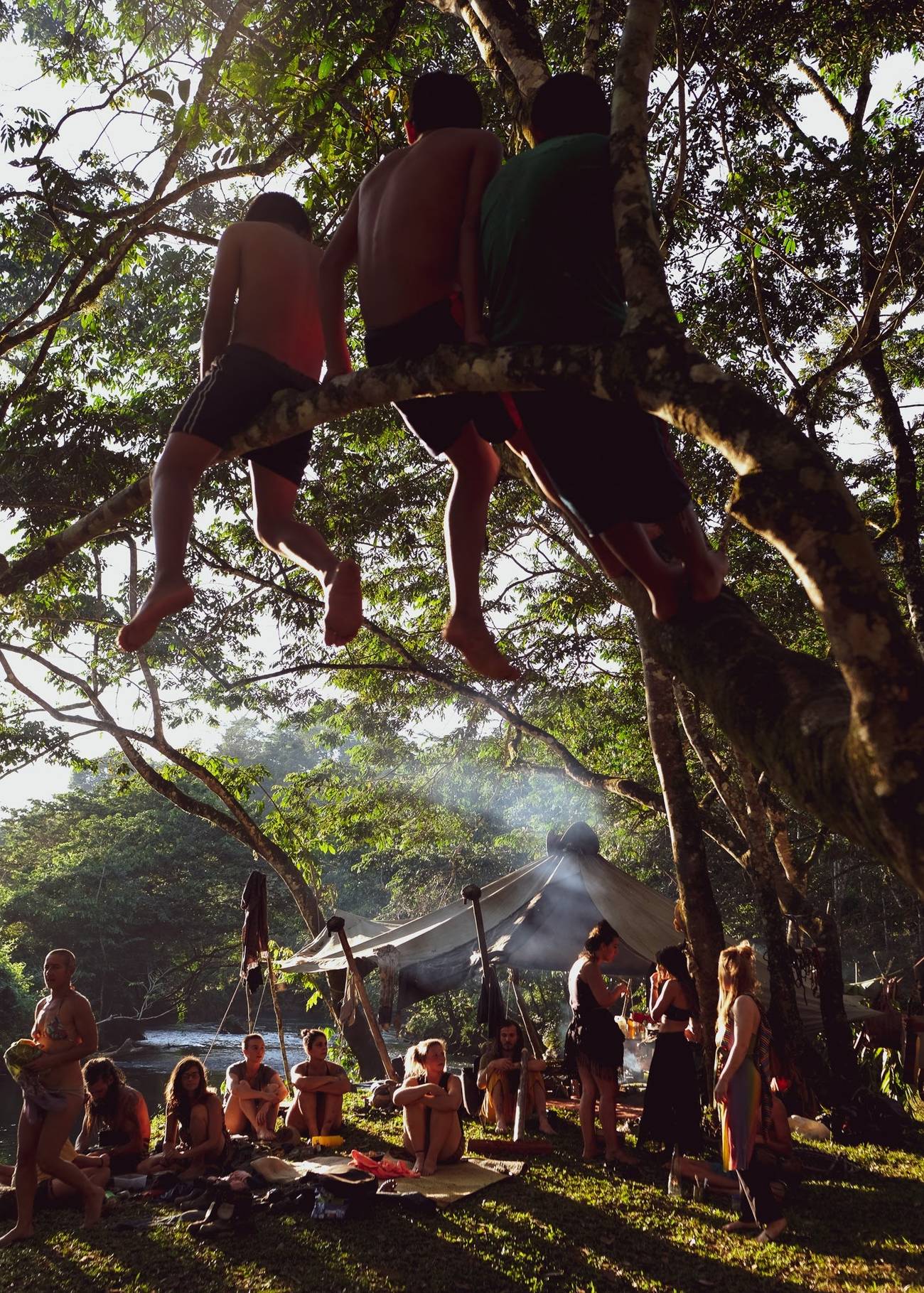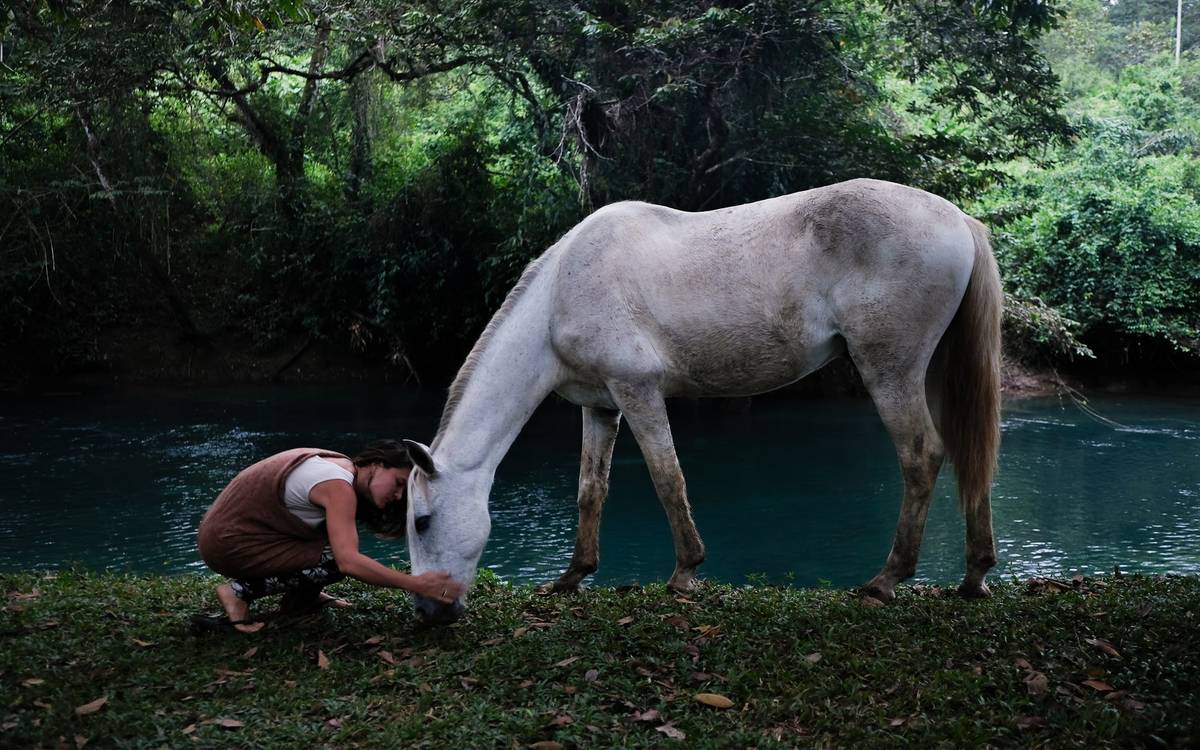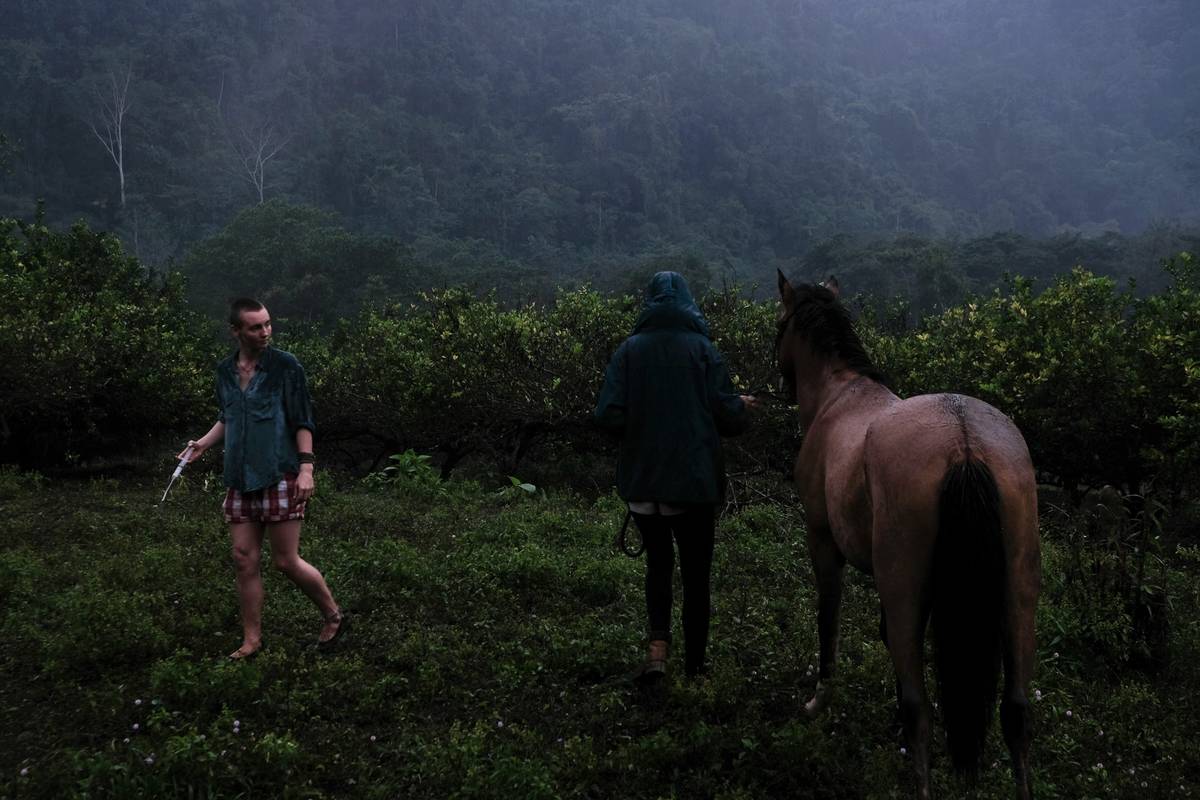Nomads United
Craving unbridled freedom after finishing their military service, some Israelis are joining horse caravans through the wilderness of South America




I met the founder of Nomads United, Kareen Kohn, a decade ago in the house of a mutual friend in Mexico City. He wore shoulder-length braids in his hair, which was shaved on the sides of his head, a vest that exposed his hairy chest, and multiple necklaces and earrings—all of which gave him the aura of a stereotypical gypsy or a genie from A Thousand and One Nights. That night, he projected a documentary film made for local television about an organization he founded called Nomads United. The film showcased dramatic scenes of what looked like medieval renegades traveling on horse caravans through the mountain ranges, forests, and jungles of southern Mexico.
This group of nomads has been moving on horseback through South America for years, embracing perpetual movement as an alternative and deeply rewarding lifestyle. They travel in remote areas away from paved roads, carrying their own food, bartering for extra, and living in tents, though they never stay in one place for more than three or four days because they run out of grass to feed the horses. Local governments generally permit their movement throughout municipalities, since traveling by horseback is common throughout rural Central America.
Born in Jerusalem, Kohn traveled through India, Brazil, Mongolia, and many more places before establishing Nomads United in 1998. He was the caravan leader until 2017, when he decided to leave because he was suffering from a herniated disc. At the time, Kohn was also expecting a child, and he felt the urge to put down roots for the first time in years. Now he owns what he describes as an idyllic property in the hipster beach town of Tulum, where he runs a glamping business and takes care of seven horses leftover from the original caravan.
“My wife is always complaining that I don’t want to travel anywhere anymore because I’ve seen it all,” Kohn, whose mother is Argentinian, told me in perfect Spanish. “But I live in paradise. I’ve had my share of movement and can’t complain.”
After Kohn’s departure, a new group took charge of the caravan, which is currently in Honduras. The organization’s alcohol-free, vegetarian, and waste-free culture draws interest mainly from Europeans, Kohn told me, though there’s also been a handful of Latin Americans in its ranks. But there’s one nationality that is constantly represented in the caravan: “Israelis! They are everywhere!” Kohn said, laughing. “In the places we visit, people think we are tens of millions!”
Many of these Israelis hear about the caravan through word of mouth, but some join it after attending an event called a Rainbow Gathering while traveling through Central America. These annual gatherings, celebrated worldwide, are spin-offs of a one-month hippie festival camp in Colorado in the early 1970s that sought to inaugurate a new human consciousness rooted in the ecological and pacifist values of the time.

Ori Yavor is a 32-year-old Israeli musician who joined the caravan from 2013 to 2014. Like many Israelis, he was drawn to Nomads United and the Rainbow Gatherings because he wanted to explore common humanity and experience a sense of unbridled freedom. After finishing high school, Israelis must complete three years of compulsory military service. Yavor believes that putting their lives on hold in such an extreme manner inspires them to seek adventures once they finish. In his opinion, Israelis are drawn to the horizontal, nonhierarchical structure of these gatherings, which are a sharp contrast to the rigid and vertical structure of army life.
Yavor met Kohn during a Rainbow Gathering in the Mayan ruins of Palenque, Mexico, to celebrate the beginning of the Mayan Calendar. He was cooking Israeli food for everyone in the camp when Kohn arrived and asked him about his travel plans.
“I told him I wanted to continue moving, very slowly, toward Costa Rica,” he told me, “and Kareen asked me if I wanted to do it while riding a horse.” After the Palenque festival ended, both took the bus to Oaxaca, where Kohn gave Yavor a horse that had been ridden by Israelis since the beginning of the caravan.
Before joining the caravan, Yavor was a member of a small IDF combat unit for four years, after which he traveled in Australia with a group of people for a year and took a 45-day walking trip with other nomads through Goa, India. But the caravan was more challenging: “From the outside, it looks amazing, but the reality is that it’s a hard life,” he said. “You need to take care of each other, collect the food, set up camp, and feed the horses.”
The Israeli urge to travel in nature after the army, Yavor believes, is part of a larger need to live intensely, a consequence of growing up in a small country in constant survival mode: “In Israel, we just can’t afford to waste time.” But it stretches beyond this: “The Jewish people have always been nomadic. We have been kicked out of many places and always need to make do with what we have.”
While many caravan members seek a counterpoint to army life, Yavor believes that their time in the military is nonetheless helpful within the caravan, as it teaches people to take care of each other and think like a tribe. “Those Israelis who become members have learned how to live in a community and to work together,” he said. “They are comfortable with taking more responsibility for others and working hard.”
Yavor himself took over for Kohn as the caravan leader for a period in 2014 while Kohn recuperated from an illness. Of this time, he remembers looking behind him excitedly and “seeing twenty or more horses ridden by people with dreadlocks and guitars, talking and making music ... the excitement of being in tune with nature, with the fire, the water, and the stars.”
This connection to nature is one of the biggest perks of living in the caravan, according to Avi Bellman, an Israeli who participated in 2015. Each nomad connects to their horse as if it were their own child. But it is the opportunity to meet and interact with distant indigenous communities that make this form of traveling so special: “As an Israeli, I’ve never been in a subtropical jungle or forest before. Being immersed in that ecosystem in Chiapas (a Mexican state bordering Guatemala) was incredible.”
Bellman was born in a kibbutz and currently lives in Northern Israel in a house he built himself out of natural materials. Like Kohn and Yavor, he was quick to stress the risk of being so far away from civilization: “It’s dangerous,” he told me. “At one point, an Israeli girl broke her leg. Luckily, at the time, we were close to a road, and she had insurance, so she managed to get transportation to a local clinic and then a flight back home, where she finally received treatment.”
But what happens if the whole world is suffering from a health crisis? The current leader of the caravan, 29-year-old Chicagoan Lauren Olswanger, believes that nomadism was particularly suited to pandemic times.
Although raised in a culturally Jewish and atheist family, her experience in the caravan and her “Rainbow family” has expanded her view on spirituality. She now worships nature above all and celebrates the oneness of the universe outside of institutionalized religion.

Olswanger has been a member of Nomads United for three years but has been traveling since she graduated from the University of Michigan with a psychology degree in 2014. During a trip to India in 2015, she attended a Rainbow Gathering, and it was through this network that she found out about a four-month-long horse caravan through Mongolia. After participating in two other festivals in New Zealand, she decided to join the adventure. But as she moved through Mongolia on horseback, she felt that this was much more than a once-in-a-lifetime, anti-capitalist, low-footprint experience: It was a way of life. “I think the main word is chosen,” she told me. “I’m not just going with the flow of a world that I was born into. Instead, I’m creating the life of my choice.”
It merits saying that are some ironies in Nomads United’s egalitarian, anti-capitalist lifestyle. Yes, their plan is to live “off the grid,” but members still rely on global networks to survive—literally, as in the case of global accident insurance, and also to call on other future nomads through Facebook pages and websites. Since the majority of the members come from Europe or Israel, that means they had to pay a relatively expensive air ticket to heed the call. The experience may be rewarding, but these rewards are still not widely accessible.
The experience is perhaps less achievable now than ever. Currently, only four women make up the caravan, whose route was upended by the pandemic. New restrictions on cross-district travel created extended stationary periods, new membership declined, and international travel restrictions forced even regular caravan members to board flights home. For the first time in Olswanger’s three years in the caravan, nobody showed up for their latest seed camp in January, a monthlong program meant to train new recruits to move around on horseback. Instead of continuing with more horses than riders, they left some of the animals in stables (paid for by the European members who left) and thought creatively about the next steps. They decided to host a Rainbow Gathering in Honduras, which was attended by about 20 people (including quite a few Israelis.) Twenty was a small number for a gathering like this, Olswanger confessed.
Despite these challenges, Olswanger believes that caravan life could be a cure for anxiety and loneliness, even suggesting that it could be much more effective than psychological or even psychiatric help. “I think a question everyone can now ask themselves is, ‘If a global lockdown happens and I am stuck spending almost all my time in one place for an unknown amount of time, where do I want to be?’” she said via WhatsApp message, from somewhere deep in the Central American wilderness.
Alan Grabinsky is a freelance writer and journalist based in Mexico City, covering Jewish life and urban issues for international media.